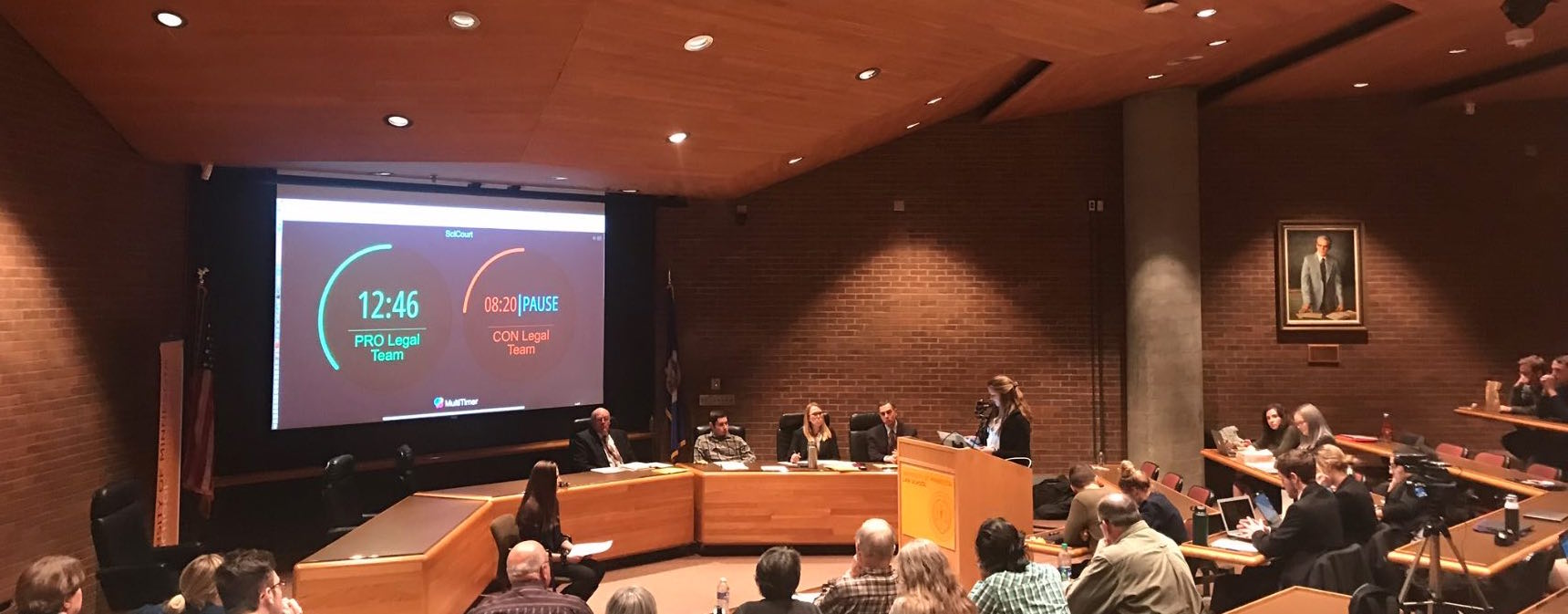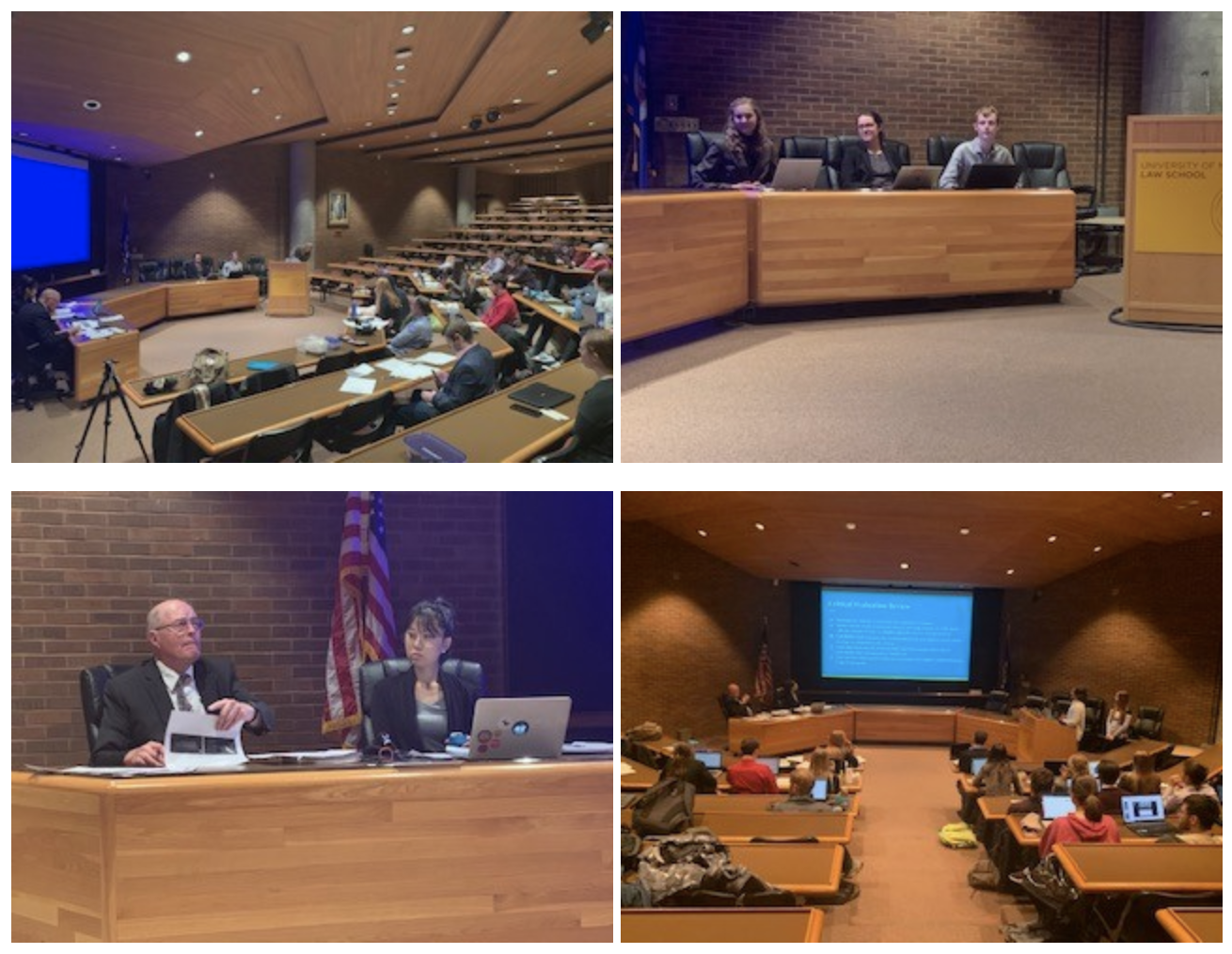
Welcome to Science Court!
Science Court is a project designed to combat polarization in American society and strengthen democracy. It is run as an interdisciplinary course in the University of Minnesota Honors Program involving students from across the university. The students select a controversial issue and spend an entire semester studying it in depth to determine the facts (based on sound scientific research) and then argue it in a mock trial in front of a jury of citizens with a mix of views and backgrounds. The public is engaged through compelling audio, video and online content generated by the students about the preparations, trial and verdict. The trial is free and open to the public.



The 2022 Science Court case is
Grading practices at the University of Minnesota can lead to bias, stress, and disincentivize learning, new innovative student assessment methods should be adopted
This year's Science Court is in partnership with the University of Minnesota (UMN) Student Senate. This topic is inspired by a Student Senate resolution, approved on December 3, 2020, requesting an extension of the UMN policy allowing students to opt for S/N grading (Satisfactory/Not satisfactory) in any course due to the COVID-19 pandemic. The Science Court case generalizes this to a full reevaluation of how students are assessed at UMN. This is timely considering increasing concerns regarding student mental health, the increased emphasis on student diversity and equity, changes in how students learn due to the technological environment, the increase in scholastic dishonesty facilitated by the internet and social media, and the rise of remote learning.
Science Court will consider student assessment holistically exploring what is known from scientific research in domains of knowledge informing this topic and propose two main strategies, Refine versus Reform, for the Student Senate to consider.
- The "Reform" (pro) approach proposes to replace the current UMN system with alternative methods for grading and student assessment proposed in the literature and tested at other institutions.
- The “Refine” (con) approach will argue to largely retain the current UMN grading system with modifications aimed at addressing its limitations based on research findings.
Stay tuned or follow us on twitter or join the Science Court mailing list to be kept informed.
LATEST BLOG POSTS
The Mock Trial with a Guest Appearance from Assistant US Attorney Tim Rank
Tonight's Science Court class began our mock trial preparation for the final trial, which...believe it or not... is a mere week and a half away! Our science team began the show tonight by presenting their domain research to the class as a practice round for their presentations at the trial. With expert feedback from Assistant US Attorney Tim Rank who joined us for tonight's class, the science domains are on track to tidy up their presentations for the trial and make sure that they are able to give our jury all of the necessary background research to make their final decision. Next week, our pro and con legal teams will present their arguments in a practice round during our last class before the trial on the 23rd. Everyone is doing some pretty incredible research and their hardwork is paying off. We can't wait to showcase all of the work we did this semester next Saturday. Hopefully, you'll join us as our journey comes to a rewarding end! Special thank you goes out to Mr. Rank for joining us tonight and giving us some very valuable tips on how to make our trial presentations more effective and our trial run smoothly!
For more details on what went down tonight, check out the pictures and live updates on our social media platforms using our handle @scicourt!
Nuclear Power: How complicated can it really be?
We've all heard of nuclear power, but how much does the average person really know about it? How important is it in the energy industry? And what is the current status of nuclear power here in the US? In this episode you'll get a crash-course in the state of nuclear power in the United States, and with it a good idea of why we're taking it to court.
Evidence Challenge: What's In and What's Out?
Yesterday evening, our Science and Legal Teams participated in the Science Court Pre-Trial Evidence Review Challenge. The members of the Science Team presented the sources that the class and instructors decided should be challenged on the grounds of relevance and cause. Each domain group argued why their sources should not be thrown out of the usable evidence pool for the trial. Judge Bill McGinnis, along with help from our guest Scientific Sources Expert, then heard arguments from both the pro and con legal teams on why they thought the Science Team's sources should be kept in evidence or removed altogether. After some very convincing research presentations and legal arguments, Judge McGinnis made his final decision and threw out 4 of the 5 sources argued on grounds of cause in addition to removing 2 of the 5 sources argued on grounds of relevance. That's a wrap on our pre-trial evidence review, so now you might be wondering what happens next? Stay tuned to keep up to date on the next few weeks of preparation for the our culminating semester event: the much awaited trial. What will the jury decide?
